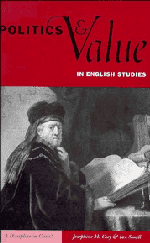Introduction
Published online by Cambridge University Press: 27 January 2010
Summary
Put briefly, the subject of this book is what has recently been termed the ‘crisis in English’; put less polemically, it is concerned with the current state (and status) of English studies in higher education. The topic is of course not new; indeed, it has produced a veritable corpus of essays, books and lectures on both sides of the Atlantic. Although the particular forms of these debates have been different in Britain and the United States, they nevertheless have many issues in common. In our opening chapters we discuss some of the local differences between Britain and America, but our main interest lies in addressing the ground common to both countries – in short, the issue of value and politics in English studies. In most accounts of English a simple but important fact has frequently been overlooked: that within higher education the study of English constitutes a discipline of knowledge. The contribution of the present book to the controversy over English lies in its attempt to locate that controversy within the context of disciplinary knowledge in general, and this, we maintain, enables us to point out some of the limitations of recent discussions about the nature of the subject. More precisely it makes clear that some of the issues which have been so heatedly debated – particularly those concerning the ideology or politics of literary criticism – have been fundamentally mischaracterized.
This conviction that English studies should not be viewed as an isolated case has led us to devote several chapters to developing a general thesis about the nature and function of disciplines of knowledge.
- Type
- Chapter
- Information
- Politics and Value in English StudiesA Discipline in Crisis?, pp. 1 - 7Publisher: Cambridge University PressPrint publication year: 1993
- 1
- Cited by



